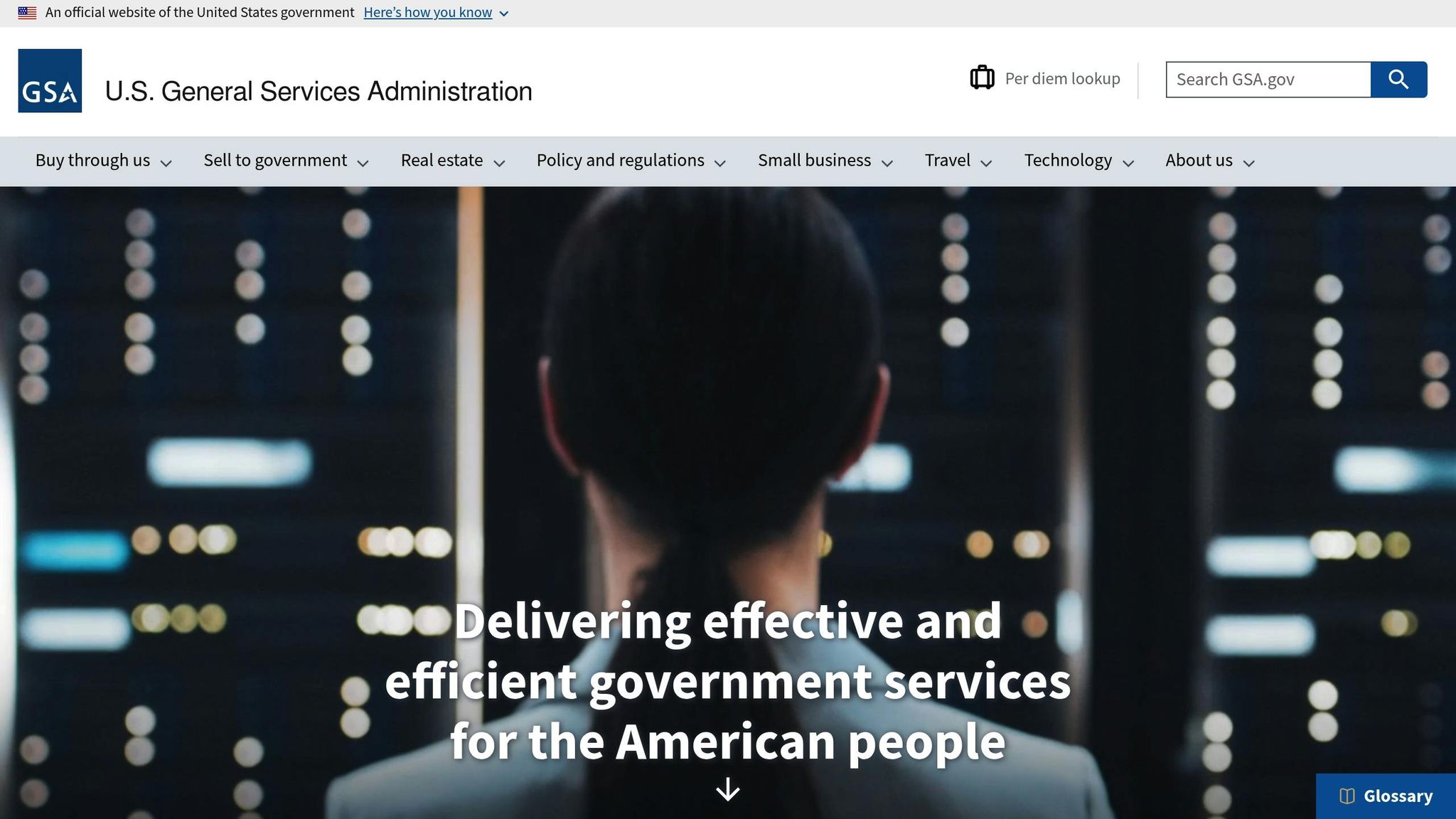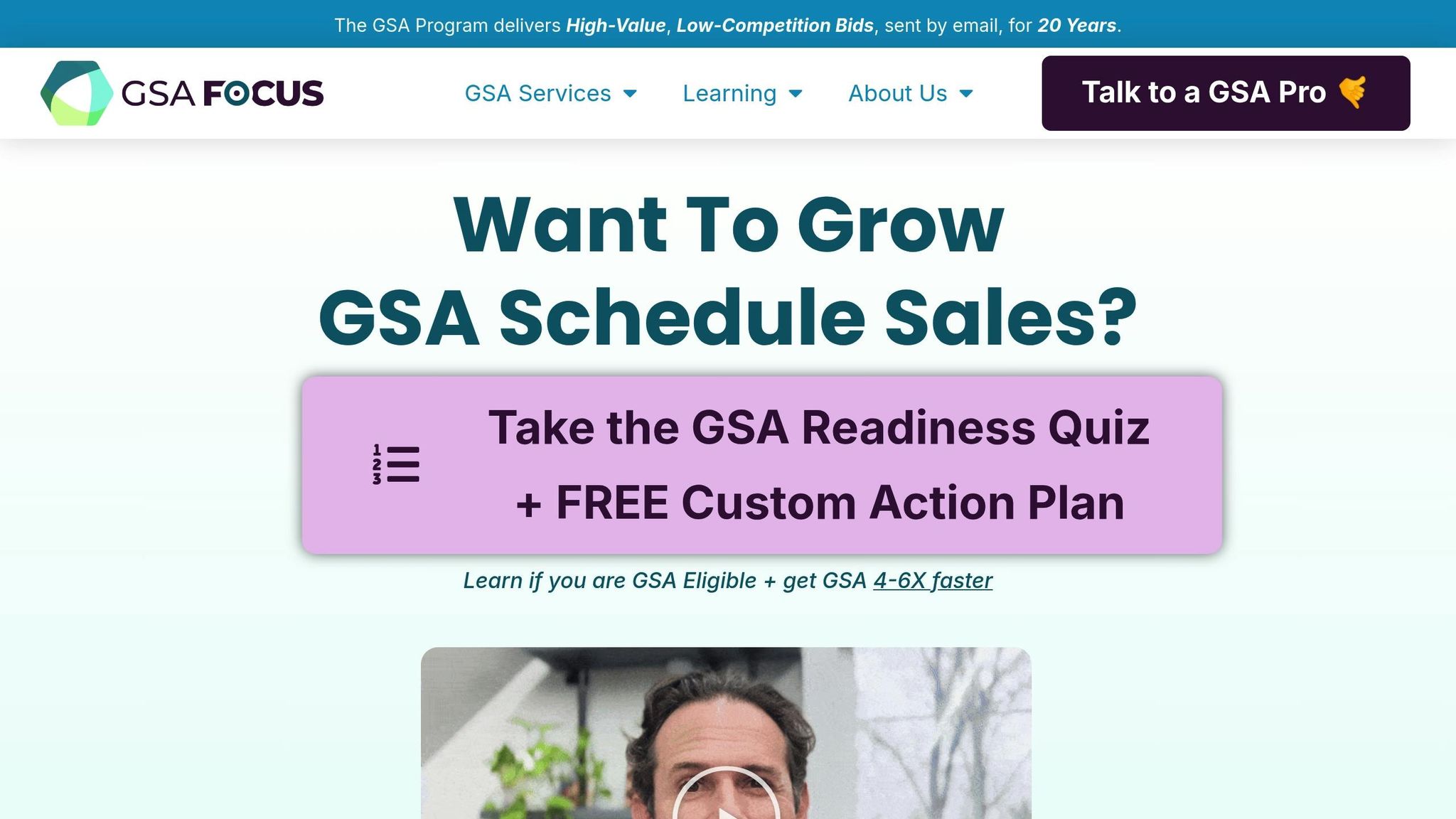Want to secure federal contracts without the stress? The pre-solicitation phase lays the groundwork for success in government contracting. This guide breaks down everything you need to know to avoid delays, meet compliance standards, and increase your chances of winning contracts.
Here’s what you’ll learn:
- Key pre-solicitation steps, like GSA Schedule eligibility and market research.
- Federal regulations you must follow (e.g., FAR, GSAM).
- Essential documents: Acquisition Requirements Package, IGCE, and SOW/PWS.
- How to verify compliance and prepare for audits.
- Why expert help can simplify the process.
Quick takeaway: Thorough preparation not only ensures compliance but also positions you as a reliable partner for government agencies. Missing steps or incomplete documents can cost you time and opportunities. Ready to streamline your approach? Let’s dive in.
How to Get a New GSA Contract (by PriceReporter)

Key Pre-Solicitation Requirements
Getting ready for pre-solicitation involves three main areas: eligibility, thorough market research, and following federal regulations. These steps are essential to move from initial planning to actionable strategies. Together, they form a solid foundation before you dive into the solicitation process.
GSA Schedule Eligibility Requirements
The GSA Schedule offers a massive opportunity, with over $51 billion in annual government contract sales. But tapping into this market requires meeting strict eligibility standards that demonstrate your business’s capability.
First, financial stability is non-negotiable. Your company must show consistent revenue and the financial resources needed to handle government contracts.
Second, the time in business requirement ensures that only experienced companies with proven track records qualify for GSA Schedule contracts. The government evaluates your operational history to determine if you’re ready to take on these responsibilities.
Third, Trade Agreements Act (TAA) compliance is mandatory. As GSA emphasizes:
"GSA fully supports Executive Order 14005 to advance the policy that the U.S. government should ‘use terms and conditions of Federal financial assistance awards and Federal procurements to maximize the use of goods, products, and materials produced, and services offered in, the United States.’"
Additional criteria include maintaining ethical business practices, offering commercially available products or services, and setting fair, value-driven pricing for government agencies. Keep in mind that the process to secure a GSA Schedule contract typically takes 3–6 months, so early preparation is key.
Market Research and Required Documents
Market research is the backbone of pre-solicitation planning. This involves gathering detailed information about market capabilities, available suppliers, and products or services to guide procurement decisions. The goal is to ensure the government gets the best value while meeting critical needs.
Your documentation should clearly outline what you’re offering and how it aligns with federal requirements.
Effective market research techniques include reaching out to industry contacts, analyzing published studies, and leveraging government databases. Agencies are required to conduct market research in specific situations, such as when developing new requirements, soliciting offers above the simplified acquisition threshold, or considering acquisitions that involve consolidation or bundling. This research helps determine if qualified sources exist and whether commercial products or services are available.
One helpful tool is GSA’s Market Research as a Service (MRAS), which provides free support for agencies. MRAS collects information from industry partners, facilitates Requests for Information (RFIs) and Sources Sought notices, and conducts advanced product searches. Using MRAS can save time and effort in your market research process.
In addition to market insights, staying compliant with federal regulations is another critical step to pre-solicitation readiness.
Federal Regulation Compliance
Federal regulations form the framework for pre-solicitation activities. The Federal Acquisition Regulation (FAR), found in Title 48 of the Code of Federal Regulations, is the primary set of rules. It’s issued jointly by the General Services Administration (GSA), the Department of Defense (DoD), and NASA.
Several key clauses impact pre-solicitation readiness:
- GSAM 522.238-113 defines which agencies can use GSA Schedules.
- FAR 52.225-5 enforces Trade Agreements Act compliance for goods and services.
- DFARS 252.204-7000 restricts the release of unclassified information for DoD contractors.
The General Services Administration Acquisition Manual (GSAM) and the General Services Administration Acquisition Regulation (GSAR) supplement the FAR with GSA-specific guidance.
While agency-specific regulations can supplement the FAR, they cannot conflict with it unless explicitly authorized by law. This means additional requirements may apply depending on the agency you plan to work with.
Since regulations can change due to legal, administrative, or policy updates, staying informed is essential. Keeping up with these changes ensures you remain eligible and avoid compliance issues during the solicitation phase.
Required Pre-Solicitation Documents Checklist
Preparing the right documents ahead of time can make all the difference between a seamless solicitation process and frustrating delays. Each document in the pre-solicitation checklist has a specific role in crafting a compliant and effective proposal. The three main categories to focus on are the Acquisition Requirements Package, the Independent Government Cost Estimate (IGCE), and the Statements of Work (SOW/PWS).
Acquisition Requirements Package
The Acquisition Requirements Package lays the groundwork for the procurement process, starting when an agency identifies the need for supplies, construction, or services.
This package should include a detailed acquisition strategy and plan, developed using an integrated product team (IPT) approach. This collaborative method brings together key players like program managers, contracting officers, and small business professionals to create a unified strategy.
Early in the planning process, document potential risks and outline strategies to address them.
At the heart of your package is the Request for Proposal (RFP). A well-crafted RFP is essential – it promotes fair competition, clearly communicates government requirements, and outlines the evaluation and award criteria. For better organization, structure your proposal into separate volumes for technical, cost, and past performance evaluations. This makes it easier for evaluators to review.
Don’t forget to include all required small business documents in compliance with FAR guidelines.
Independent Government Cost Estimate (IGCE)
Once your acquisition strategy is set, focus on creating a detailed cost estimate. The IGCE reflects the government’s estimated cost or price for the acquisition. This document is critical for several reasons: it helps reserve funds, serves as a benchmark for comparing offerors’ costs, and determines whether proposed prices are reasonable.
Typically prepared by the Contracting Officer Representative (COR), the IGCE is kept confidential between the COR and the contracting officer. It is mandatory for acquisitions exceeding the simplified acquisition threshold.
Your IGCE should include all relevant cost elements, such as:
- Materials, licenses, and supplies
- Direct labor and overhead
- Other direct costs (e.g., travel, subcontractors)
- Fees, cost reimbursements, and administrative expenses
Break down the estimate to cover each subtask in the Statement of Work (SOW). Ensure your methodology is clearly documented by explaining how the estimate was created and referencing any data sources or standards used. Common methods include using historical data, industry standards, prior purchase comparisons, or market price research .
For labor, specify the required categories and hours for each task outlined in the SOW. Travel estimates should align with SOW requirements and include details like destinations, number of trips, personnel involved, and trip durations, all while adhering to Federal Travel Regulations.
Statements of Work (SOW/PWS)
A clear definition of work deliverables and performance outcomes is key. A Statement of Work (SOW) describes contractor efforts in non-specification terms, while a Performance Work Statement (PWS) focuses on the required results, using measurable outcomes. Performance-based contracting emphasizes results and performance standards, allowing contractors flexibility in how they achieve those results. In contrast, a traditional SOW may specify the exact tasks and methods.
FAR Part 37.602 outlines the essentials for performance-based contracting, including the need for a PWS, measurable performance standards, and a quality assurance plan.
For even more flexibility, consider using a Statement of Objectives (SOO). This document outlines overall performance objectives and gives contractors room to propose creative solutions. However, note that while the SOO is not retained as a compliance item, the SOW and PWS are.
An effective PWS should include:
- Clearly defined objectives and scope
- Specific performance requirements, deliverables, and standards
- Assumptions or constraints that might affect the contract
Focus on describing the desired outcomes rather than prescribing how the work should be done or how many hours are required. Measurable performance standards are crucial – they allow for effective evaluation of contractor performance and can encourage cost-effective and innovative approaches through financial incentives.
sbb-itb-8737801
How to Verify Compliance and Readiness
Getting your documents in order is just one part of the process; the real challenge lies in verifying compliance. This step is what ensures your solicitation proceeds smoothly without unnecessary delays.
Document Review Process
The General Services Administration (GSA) review process is a detailed, multi-step evaluation designed to confirm contractor eligibility for Multiple Award Schedule (MAS) contracts. It applies to new MAS offers, contract modifications, and certain extensions, all with the goal of upholding integrity, transparency, and value in federal procurement. GSA Contracting Officers and Acquisition Specialists conduct these reviews, guided by the Federal Acquisition Regulation (FAR), General Services Administration Acquisition Manual (GSAM), and category-specific criteria.
To navigate this process effectively, you need to understand its structure. It includes several stages: intake, administrative validation, technical evaluation, pricing review, compliance checks, negotiations, and final award. Success hinges on thoroughly reading the MAS Solicitation and category-specific attachments, which outline the required formats, documents, and evaluation standards.
When submitting your documents, ensure they are well-organized and logically named, making it easier for reviewers to locate and assess them. Common pitfalls that slow down the review include inconsistent pricing data, missing or outdated paperwork, incomplete technical narratives, failure to follow SIN-specific instructions, and inadequate price reasonableness justifications. Addressing these issues during your internal review can save valuable time and prevent delays. Once your documents clear the external review, focus on strengthening internal controls to ensure a smooth audit process.
Internal Approvals and Audit Preparation
To stay audit-ready, designate a single point of contact and maintain an archive of all communications.
Using a centralized document management system can make audit preparation much easier. This system allows you to keep everything organized and accessible. Regular internal audits are also crucial for identifying and resolving problems before they escalate. Setting up approval workflows that mirror the GSA review process can help you catch potential issues early on. These internal strategies form a strong foundation for verifying compliance with detailed checklists.
Using Compliance Checklists
A compliance checklist is your best friend when it comes to staying on track. Create a list of all required documents and submission steps, and make sure every item is accounted for. Implement a system to monitor compliance, educate your team, and establish internal controls.
After your contract is awarded, a GSA representative, known as an industrial operations analyst, will be assigned to help you maintain compliance throughout the contract term. Responding promptly and thoroughly to their clarification requests will keep your process moving forward smoothly.
Getting Expert Help for Pre-Solicitation Preparation
Navigating the pre-solicitation phase in federal contracting can feel overwhelming. This stage involves intricate requirements and detailed compliance measures, which is why seeking professional guidance can make a world of difference.
Why Expert Help Matters
GSA Schedule consultants bring a wealth of knowledge to the table, simplifying what is often a confusing and time-intensive process. Their expertise ensures that proposals align perfectly with government solicitations, increasing the likelihood of success.
One key advantage is their ability to craft proposals that are not only compliant but also highly tailored to meet specific agency needs. They streamline the document preparation process, helping businesses avoid missteps that could lead to delays or rejections.
Additionally, consultants help companies expand their reach in the federal market by identifying new opportunities and diversifying their offerings. They also assist with negotiations and contract awards, ensuring businesses stay compliant with all contractual requirements.
How GSA Focus Simplifies Pre-Solicitation Readiness

GSA Focus takes the guesswork out of the pre-solicitation phase by offering a range of services that make the process smoother and more efficient. They start preparations early, right at the acquisition planning stage.
Their team handles the entire documentation process, from creating acquisition requirement packages to drafting statements of work. This ensures that submissions meet all compliance standards, reducing the risk of errors or omissions.
What sets GSA Focus apart is their thorough approach to compliance. They go beyond basic document checks, using tools like correlation matrices to ensure consistency across all sections of a proposal. This attention to detail is crucial during the source selection process.
Negotiation support is another cornerstone of their service. For many small businesses, navigating federal contract negotiations can be daunting. GSA Focus provides expert guidance, helping clients understand what’s negotiable and ensuring all contractual obligations are met.
Their track record speaks volumes, with a 98% success rate and a refund guarantee that underscores their confidence in delivering results. They also offer a secure online platform for submitting documents and tracking progress, adding an extra layer of convenience.
Beyond securing the initial contract, GSA Focus provides ongoing advisory services to help businesses maintain compliance with GSA Schedule requirements. This continuous support helps companies avoid costly mistakes and remain eligible for future federal opportunities. By taking care of the complexities, GSA Focus allows business owners to concentrate on what they do best – running their business – while leaving the intricacies of federal contracting to the experts.
Conclusion and Key Points
This checklist is more than just a guide – it’s your game plan for navigating federal contracting with confidence. Pre-solicitation readiness plays a critical role in securing success, ensuring that every box is checked, from eligibility requirements to document preparation.
Consider this: the General Services Administration (GSA) Multiple Award Schedule (MAS) program handles an astounding $35 billion annually. Yet, many first-time applicants stumble over avoidable mistakes like choosing the wrong Special Item Number (SIN), submitting incomplete financial documents, or overlooking compliance requirements.
Attention to detail and expert advice are game-changers. Take the example of a mid-sized IT services firm that partnered with a GSA consultant in 2025. They nailed their Schedule contract on the first try and saw a 30% revenue boost in just one year. Contrast that with a small manufacturer who, opting to go it alone, faced a frustrating year-long delay.
The takeaway? Avoiding compliance and documentation errors is crucial, and that’s where expert guidance makes all the difference. Consultants bring a deep understanding of GSA regulations, help you sidestep common pitfalls, and offer tailored advice on tricky areas like SIN selection and financial documentation. Their support doesn’t stop at submission – they’re there to help tackle evaluation challenges and guide any necessary updates.
Think of the pre-solicitation checklist as your roadmap to success. With support from GSA Focus, tasks like document preparation, compliance checks, and negotiation become far less daunting. And with a 98% success rate and a refund guarantee, you can approach the process with confidence.
FAQs
What are the main advantages of obtaining a GSA Schedule contract, and how can my business qualify for one?
Securing a GSA Schedule contract can open the door to a range of benefits, like gaining access to federal contracting opportunities, streamlining procurement processes, and building trust with government buyers. It also positions your business as a reliable supplier for federal agencies, giving you a competitive advantage and the potential for steady, long-term revenue.
To qualify for a GSA Schedule contract, your business typically needs to meet these essential requirements:
- Operational history: Your business should have at least two years of experience with a solid performance record.
- Financial health: Demonstrating financial stability and dependable performance is key.
- SAM registration: An active registration in the System for Award Management (SAM) is mandatory.
- Compliance: You’ll need to adhere to all GSA program guidelines and any industry-specific standards.
By meeting these qualifications, your business will be well-positioned to take advantage of the opportunities the federal marketplace has to offer.
How can a GSA Schedule consultant help simplify the pre-solicitation process and improve my chances of success?
When it comes to navigating the pre-solicitation phase for a GSA Schedule, a consultant can make the process far less daunting. These professionals offer guidance tailored specifically to your business, ensuring that all necessary documents are prepared correctly and that you meet the often-complicated compliance requirements.
With their expertise, you’ll not only save time but also sidestep costly errors that could derail your efforts. Plus, they can provide strategies to make your proposal stand out, boosting your chances of landing a GSA Schedule Contract – a move that could unlock lucrative federal contracting opportunities.
What are the common mistakes businesses make during the pre-solicitation phase, and how can they avoid them?
During the pre-solicitation phase, businesses often face a few common hurdles that can derail their efforts if not handled carefully:
- Weak market research: Skipping a deep dive into the competitive landscape or failing to grasp customer needs can lead to proposals that miss the mark. Invest time in analyzing your market thoroughly to uncover opportunities that align with what your business does best.
- Incomplete or unclear documentation: Missing details or vague language in solicitation documents can create unnecessary delays or even lead to disqualification. Make sure your paperwork is accurate, complete, and meets all federal requirements to avoid setbacks.
- Non-compliance with federal regulations: Overlooking or misunderstanding federal rules can lead to costly mistakes. It’s crucial to fully understand the compliance standards and meticulously review every submission to ensure it aligns with the necessary guidelines.
By tackling these challenges head-on, businesses can simplify the pre-solicitation process and better position themselves for success in federal contracting.
Related posts
- GSA Proposal Formatting Checklist
- How to Read GSA Solicitation Documents
- GSA Post-Award Checklist for Contractors
- Checklist for GSA Construction Contract Compliance



